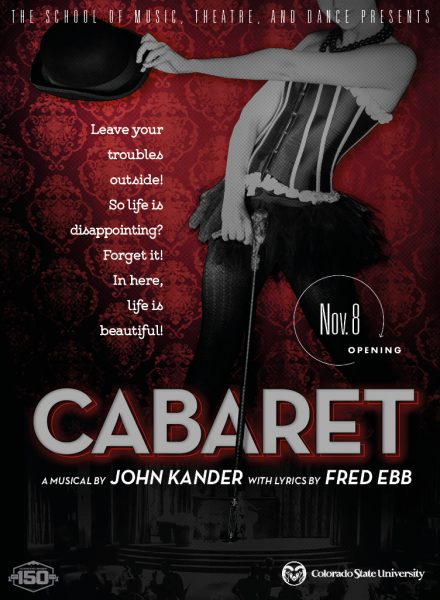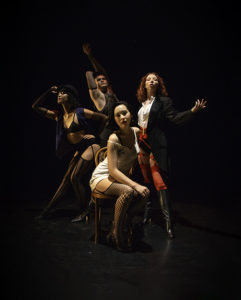 The Colorado State University School of Music, Theatre, and Dance presents Cabaret, the musical composed by John Kander with lyrics by Fred Ebb. The play opens on Nov. 8 at the University Center for the Arts and runs through Nov. 17. The production is directed and choreographed by Noah Racey by Noah Racey with musical direction by Aaron Gandy.
The Colorado State University School of Music, Theatre, and Dance presents Cabaret, the musical composed by John Kander with lyrics by Fred Ebb. The play opens on Nov. 8 at the University Center for the Arts and runs through Nov. 17. The production is directed and choreographed by Noah Racey by Noah Racey with musical direction by Aaron Gandy.
Cabaret — based on Christopher Isherwood’s 1939 short novel, Goodbye to Berlin — originally opened in 1966 and ran for 1,165 performances, winning the New York Drama Critics’ Circle Award for best musical and eight Tony awards. A compelling, dance-driven musical, Cabaret is set in 1931 Berlin under the shadow of the Nazi rise to power. With this setting, it broke new ground tackling subject matter such as anti-Semitism and hedonism, which was unprecedented in Broadway musicals.
"I am a camera with its shutter open, quite passive, recording, not thinking." — Christopher Isherwood, Goodbye to Berlin
Focusing on the nightlife at the sexy, seedy Kit Kat Klub, the play revolves around American writer Cliff Bradshaw and his relationship with English cabaret performer Sally Bowles. Another minor storyline follows Fräulein Schneider and her elderly suitor Herr Schultz, a Jewish fruit vendor. The play alludes to the characters turning a blind eye to the terrible things that were happening around them during the time of the Nazis' rise to power.
Cabaret is a living musical. With each revival, different elements of the musical come to the surface, coinciding with the dichotomy of currently prevalent situations. This is particularly evident through the Emcee character. The club’s master of ceremonies delivers ribald songs that explore the dark, intoxicating, and turbulent life of Berlin’s citizens and expatriates under an emerging Third Reich.
“The musical’s warning about the temptations of fascism, nationalism, and prejudice — the way they can sneak up on you when you’re having fun — has never seemed dated or irrelevant.” —L.A. Times
 Asking hard questions
Asking hard questions
The show’s director and choreographer, Theatre Professor Noah Racey, is a firm believer in theatre’s role of asking hard questions, but not answering them. “With Cabaret, we are continuing CSU’s tradition of rich, idea-based, and substantial scripts, not just fun productions, but scripts that ask hard questions, like ‘at what risk comes self-preservation?’” he says.
Racey explains that from his perspective, the proclivity for not considering contrasting opinions and ideas isn’t improving society. “People aren’t listening and aren’t talking to each other. Cabaret asks, ‘If we lose the ability to communicate with one another and to think in multi-faceted ways, what will die?’”
The way the musical prompts discussion is precisely why Racey selected the show.
“In beautiful Kander and Ebb fashion, the show is ruthless in its refusal to coddle and give answers," he says. "Life is messy, and the music exemplifies the beauty of that mess so perfectly.”
A collaborative success
In a multi-layered collaboration between areas within the School of Music, Theatre, and Dance, the production takes the department deeper into the realm of dance-based musicals than it has previously explored. As actors are expected to be excellent dancers, and vice versa, the students are internalizing the intense physicality and pace of the production. The result is phenomenal.
Not to be outdone, the technical design department is displaying its award-winning abilities. Junior theatre major Whitney Roy’s set depicts the after-hours entertainment community of the Weimar Republic, and senior theatre major Lachlan Fordyce delivers a professional lighting package.
The play’s musical director is guest artist Aaron Gandy, a specialist in American musical theater and American popular song. “Aaron came out of the first music rehearsal over the moon,” Racey says. “The music department’s desire to collaborate and give us the time needed for this work is very exciting.”
“You have to be willing to pump blood into it for it to work as well as it can,” Racey says of the level of possibility that’s being set during his second production since coming from Broadway to CSU last fall. “Everyone is aiming higher — the student body is poised to take any challenge like this and run with it.”
In here, life is beautiful
Cabaret has a history of providing the audience with an immersive experience. The show breaks down the fourth wall, making the audience feel like they are both present in the Kit Kat Klub and that the characters’ struggles are pertinent to the audience today.
As they say in the play, “Leave your troubles outside! So life is disappointing? Forget it! In here, life is beautiful!”
Dates and tickets
This two-weekend run takes place on Nov. 8, 9, 14, 15, 16, at 7:30 p.m., with 2 p.m. matinees on Nov. 10 and Nov. 17. All performances take place in the University Theatre at the University Center for the Arts, located at 1400 Remington Street.
Tickets are available at the University Center for the Arts ticket office in the UCA lobby Monday through Friday, 3:30-5:30 p.m. and 60 minutes prior to performances, by phone at (970) 491-ARTS (2787), or online at www.CSUArtsTickets.com.

